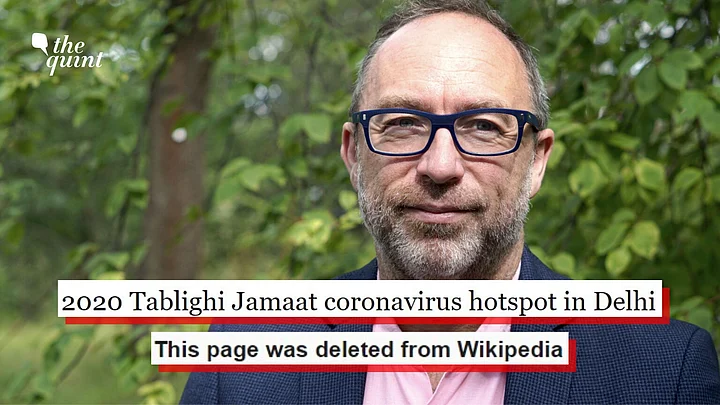A Twitter user on Thursday, 16 April, alleged that Wikipedia had accepted payment to delete an article titled ‘2020 Tablighi Jamaat coronavirus hotspot in Delhi’.
“How much will our media and woke intellectuals hide their wrongdoings?” she quipped in her tweet, which has more than two thousand likes and a thousand retweets – and some very baffled responses from Wikipedia founder Jimmy Wales.
Replying to her, Wales explained that the online encyclopedia “doesn't work that way.” “We don't accept payment to include things, nor to delete them,” he said.
‘Poorly Written, No Sources’
In the ensuing back and forth, the user insisted that the article be restored since it is “important for people to know the current hotspots in India.”
Wales, however, said that the article had been deleted because was “it was incredibly poorly written and had zero sources”. “This isn’t about religious sentiments, it’s about not putting junk into Wikipedia,” he added.
“Wikipedia doesn’t work like that. We engage in serious rational discussion. It’s very different from the madhouse of Twitter.”Jimmy Wales, Wikipedia founder
Responding to comments pointing out that there are several such poor-quality articles on the website, he said, “Of course there are a great many things that should be deleted from Wikipedia. New bad things are entered and deleted every day. This is the normal operation of Wikipedia.”
“Twitter lynch mobs aren't really helpful to the pursuit of truth,” he added.
‘Are You on Drugs?’
Bewildered by a tweet presumably implying that Wikipedia articles don’t usually cite sources (the tweet has since been deleted), Wales replied, “Almost every article on Wikipedia has sources. Are you on drugs?”
Meanwhile, other users rose to the defence of Wikipedia. “Stop wasting the man's time. He already told you Wikipedia doesn't take bribes. Write your article in a professional manner and give sources. This isn't Twitter...” wrote a user.
What Really Happened
Looking at the page history of the article in question, The Quint was able to get a better look at why the decision was taken and the discussion that led up to it.
Earlier versions of this page, like Wales mentioned, were poorly written and had no sources whatsoever. However, later versions of the article were more fleshed out, with proper citations and links to Indian and international news organisations.
It is critical to note that Wikipedia doesn’t rely on majority voting, but instead a “consensus” system, based on the merit of the arguments presented.
Also notable is the fact that the person who originally nominated the article for deletion, later retracted his nomination “because the size of the hotspot has turned out to be much larger than previously known.”
However, the administrator reviewing the page, Sandstein, still decided that it needed to be scrapped.
His reasoning included the fact that separate articles, for both the Tablighi Jamaat and COVID-19 in India, already exist on Wikipedia.
He also took into account that Wikipedia aims to be “a high-quality, free-content encyclopedia in an atmosphere of camaraderie and mutual respect among contributors” and that multiple articles on such divisive topics were bound to create inconsistencies in the information presented to the reader.
Here is his reasoning, reproduced in full:
The result was delete. My understanding of the relevant background is this: There is a lot of reliable coverage of this Islamic religious gathering contributing to the spread of COVID-19 in India. At the same time, there are a lot of tensions between Hindus and Muslims in India, and there is also increasing state-sanctioned Islamophobia and persecution of Muslims in India.
All of this divides our editorship, as is evident from some of the more questionable "keep" and "delete" opinions, and makes it very difficult to assess consensus. There is no numerical consensus, and both sides make valid arguments: there is a lot of coverage, which contributes to notability, but there are also existing articles about both the religious movement and COVID-19 in India, which calls into question the need for yet another article.
In my view, arguments based on notability criteria should not be given decisive weight in the context of this kind of topic. We have established notability criteria in order to distinguish unimportant topics such as run-of-the-mill garage bands or housing developments from important ones. But notability arguments fall short where all agree that the topic at issue is important, but that the question is how to best order and present the content.
In this context, I believe that the arguments made here against creating another article are significantly more persuasive in the light of the purpose of Wikipedia, which is "to create a high-quality, free-content encyclopedia in an atmosphere of camaraderie and mutual respect among contributors". Both COVID-19 and the India/Pakistan topic area are highly volatile and rife with misinformation and tensions in the real world and on Wikipedia.
It is beneficial to the project and our readers to limit the number of articles in which such topics are discussed, in order to force editors with different points of view to come to an agreement over how to neutrally address these issues, rather than to create forks that, if only because of their number, are difficult to keep consistent, neutral and free from misinformation that can have a disruptive impact on the real world. For these reasons, I am giving more weight to the "delete" opinions in this discussion.
Islamic organisation Tablighi Jamaat has come under focus after several of its preachers tested positive for COVID-19 in at least three different locations across India, in what could be the biggest cluster spread of COVID-19 in the country yet.
The organisation’s leader in India, Maulana Saad Kandhalvi, has been booked for culpable homicide after some of the attendees of the religious congregation died due to coronavirus, police said on 15 April.
At the same time, the Enforcement Directorate (ED) has filed a money laundering case against Kandhalvi, as well as trusts linked to the Jamaat, and others, officials told PTI.
(With inputs from PTI)
